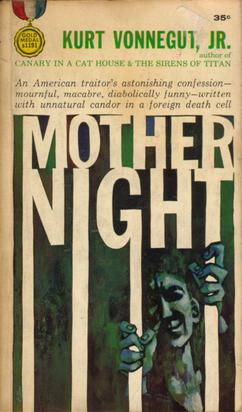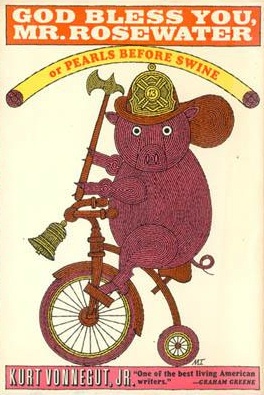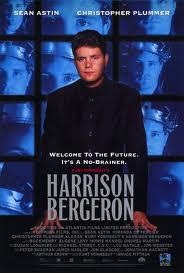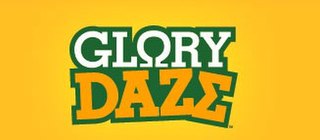This article needs additional citations for verification .(February 2023) |
"The Package" is a short story by Kurt Vonnegut, first published on 26 July 19, 1952 in Collier's weekly , and later in Bagombo Snuff Box in 1999. [1]
This article needs additional citations for verification .(February 2023) |
"The Package" is a short story by Kurt Vonnegut, first published on 26 July 19, 1952 in Collier's weekly , and later in Bagombo Snuff Box in 1999. [1]
The story concerns very successful retired businessman Earl Fenton and his wife, who worked their entire lives to get where they are. The day they return from a trip around the world and move into their brand new house with all the modern conveniences, an old friend from college, Charlie, arrives in town and calls from a local hotel. He has come into town to visit Fenton. The two went to college, where Charlie was one of the rich kids, while Fenton had to work hard, in looking back on the time Fenton perceived that his need to work his way through college made him a "second class" person in his fraternity, but when questioned by his wife could not remember any specific things that the "rich" fraternity brothers said or did. Now Fenton, who is very proud of what he has accomplished in his life, wants to show this to his former college frat brother. He takes the opportunity that comes up to show off his new house and talk about his success. Later his wife points out that Charlie doesn't appear as well-off as Fenton and a discussion ensue about the possible causes of this downfall, all of which reflect poorly on Charlie. After Fenton spends considerable time bragging about his current state he and his wife come up with an excuse to ask Charlie to reconsider their invitation to stay at the house, Charlie thanks him for his hospitality and leaves. Later, Fenton discovers that Charlie spent his fortune, and dedicated his life to treating poor people in China, until he was jailed and then kicked out of the country. This discovery caused Earl and his wife to regret the way they treated Charlie and wish for a way to start the day over and do a better job of it.

Kurt Vonnegut was an American writer and humorist known for his satirical and darkly humorous novels. In a career spanning over 50 years, he published fourteen novels, three short-story collections, five plays, and five nonfiction works; further collections have been published after his death.

Cat's Cradle is a satirical postmodern novel, with science fiction elements, by American writer Kurt Vonnegut. Vonnegut's fourth novel, it was first published in 1963, exploring and satirizing issues of science, technology, the purpose of religion, and the arms race, often through the use of morbid humor.

Slaughterhouse-Five, or, The Children's Crusade: A Duty-Dance with Death is a 1969 semi-autobiographic science fiction-infused anti-war novel by Kurt Vonnegut. It follows the life and experiences of Billy Pilgrim, from his early years, to his time as an American soldier and chaplain's assistant during World War II, to the post-war years, with Billy occasionally traveling through time. The text centers on Billy's capture by the German Army and his survival of the Allied firebombing of Dresden as a prisoner of war, an experience which Vonnegut himself lived through as an American serviceman. The work has been called an example of "unmatched moral clarity" and "one of the most enduring anti-war novels of all time".

Bluebeard, the Autobiography of Rabo Karabekian (1916–1988) is a 1987 novel by American author Kurt Vonnegut. It is told as a first-person narrative and describes the late years of fictional Abstract Expressionist painter Rabo Karabekian, who first appeared as a minor character in Vonnegut's Breakfast of Champions (1973). Circumstances of the novel bear rough resemblance to the fairy tale of Bluebeard popularized by Charles Perrault. Karabekian mentions this relationship once in the novel.

Mother Night is a novel by American author Kurt Vonnegut, first published in February 1962.

The Sirens of Titan is a comic science fiction novel by Kurt Vonnegut Jr., first published in 1959. His second novel, it involves issues of free will, omniscience, and the overall purpose of human history. Much of the story revolves around a Martian invasion of Earth.

Player Piano is the first novel by American writer Kurt Vonnegut Jr., published in 1952. The novel depicts a dystopia of automation partly inspired by the author's time working at General Electric, describing the negative impact technology can have on quality of life. The story takes place in a near-future society that is almost totally mechanized, eliminating the need for human laborers. The widespread mechanization creates conflict between the wealthy upper class, the engineers and managers, who keep society running, and the lower class, whose skills and purpose in society have been replaced by machines. The book uses irony and sentimentality, which were to become hallmarks developed further in Vonnegut's later works.

God Bless You, Mr. Rosewater, or Pearls Before Swine, Kurt Vonnegut's fifth novel, was published in 1965 by Holt, Rinehart and Winston and as a Dell mass-market paperback in 1970. A piece of postmodern satire, it gave context to Vonnegut's following novel, Slaughterhouse-Five and shared in its success.

Slapstick, or Lonesome No More! is a novel by American author Kurt Vonnegut. Written in 1976, it depicts Vonnegut's views of loneliness, both on an individual and social scale.
Kilgore Trout is a fictional character created by author Kurt Vonnegut. Trout is a notably unsuccessful author of paperback science fiction novels.
Ilium is a fictional town in eastern New York state, used as a setting for many of Kurt Vonnegut's novels and stories, including Player Piano, Cat's Cradle, Slaughterhouse-Five, and the stories "Deer in the Works", "Poor Little Rich Town", and "Ed Luby's Key Club". The town is dominated by its major industry leader, the Ilium Works, which produces scientific marvels to assist, or possibly harm, human life. The Ilium Works is Vonnegut's symbol for the "impersonal corporate giant" with the power to alter humankind's destiny. The town has been compared to Zenith, the fictional setting in Sinclair Lewis's 1922 novel Babbitt.
Robert B. Weide is an American screenwriter, producer, and director. He has directed a number of documentaries and was the principal director and an executive producer of Curb Your Enthusiasm for the show's first five years. His documentaries have focused on four comedians: W. C. Fields, Mort Sahl, Lenny Bruce, and Woody Allen. His latest documentary, Kurt Vonnegut: Unstuck in Time (2021), explores the life and works of Kurt Vonnegut.

Sylvie and Bruno, first published in 1889, and its second volume Sylvie and Bruno Concluded published in 1893, form the last novel by Lewis Carroll published during his lifetime. Both volumes were illustrated by Harry Furniss.

Harrison Bergeron is a 1995 cable science fiction television movie film loosely adapted from Kurt Vonnegut's 1961 dystopian short story of the same name. It was produced for Showtime and first screened on August 13, 1995. It was released to VHS in 1998.
"Welcome to the Monkey House" is a Kurt Vonnegut short story that is part of the collection of the same name. It is alluded to in God Bless You, Mr. Rosewater as one of Kilgore Trout's stories.
"EPICAC" is a short story in the book Welcome to the Monkey House by Kurt Vonnegut. It was the first story to feature the fictional EPICAC computer later used in Vonnegut's novel Player Piano in 1952. It was published on 25 November 1950, for Collier's Weekly, and reprinted in the February 1983 PC Magazine.
Dan Wakefield is an American novelist, journalist and screenwriter.

Glory Daze is an American comedy-drama television series. The one-hour series revolves around a group of college freshmen who pledge a fraternity in 1986. The series aired from November 16, 2010, to January 18, 2011, on TBS.
Samuel Matthew Moffie is an American novelist, bar owner and political activist.